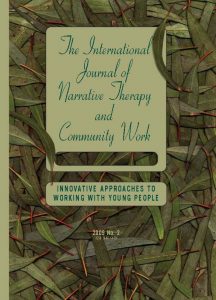2009: Issue 2
 Dear Reader,
Dear Reader,
Welcome to this diverse issue of the International Journal of Narrative Therapy and Community Work. The first section focuses on innovative approaches to working with young people. The lead paper, by Julie Tilsen and David Nylund, ‘Popular culture texts and young people: Making meaning, honouring resistance, and becoming Harry Potter’ describes ways in which narrative therapy practices and an engagement with popular culture can work hand-in-hand. The second paper, by Susannah Sheffer, explores how fiction-writing can assist young people to communicate experience after the death of a loved one.
The second section of this journal issue includes papers from Palestinian and Indian therapists. Dulwich Centre has a long history of partnership with therapists in the Middle East. Our team makes regular visits to this region to work closely with the Barcai Institute and Qesem Center in Tel Aviv and Jerusalem, and the Treatment and Rehabilitation Center for Victims of Torture (TRC) in Ramallah. Recent journal issues have featured the work of Israeli therapists Yael Gershoni, Saviona Cramer, Tali Gogol-Ostrowsky, Yishai Shalif and Rachel Paran.
This journal issue includes a paper by Palestinian therapist Nihaya Mahmud Abu-Rayyan which is entitled the ‘Seasons of Life: Ex-detainees reclaiming their lives’. This is a paper that we believe will be of significant assistance to those working with ex-detainees, or ex-prisoners in many different parts of the world. By publishing the papers of both Israeli and Palestinian colleagues, all of whom deplore violence against civilians, we hope to convey how therapists from both sides are seeking to stop the cycle of violence. There is something extremely significant to us about the ways in which Palestinian and Israeli therapists, out of experiences of profound conflict, terror and violence, are offering practitioners in different parts of the world new ways of responding to hardship.
Following Nihaya Mamud Abu-Rayyan’s paper, we are delighted to include the first paper we have ever published describing narrative therapy within India. Kalyani Vishwanatha describes the use of narrative approaches with a young girl.
Part Three of this journal issue focuses on narrative explorations in clinical health psychology, featuring a paper from Rob Whittaker.
And finally, we have included two papers that involve talking about sex and sexual identity. Barbara Baumgartner’s paper ‘A multiplicity of desire: Polyamory & relationship counselling’ was offered as a keynote address at the 9th International Narrative Therapy and Community Work Conference in Adelaide in November last year. Ash Rehn’s paper, ‘Is this sex addiction? Questioning “sex addiction” in therapeutic counselling conversations’ poses questions about the construction of sex addiction within psychotherapy.
This issue contains writings from authors from the USA, Canada, Palestine, UK and Australia. It is a diverse collection! As always, we welcome your feedback.
Warm regards,
Cheryl White
